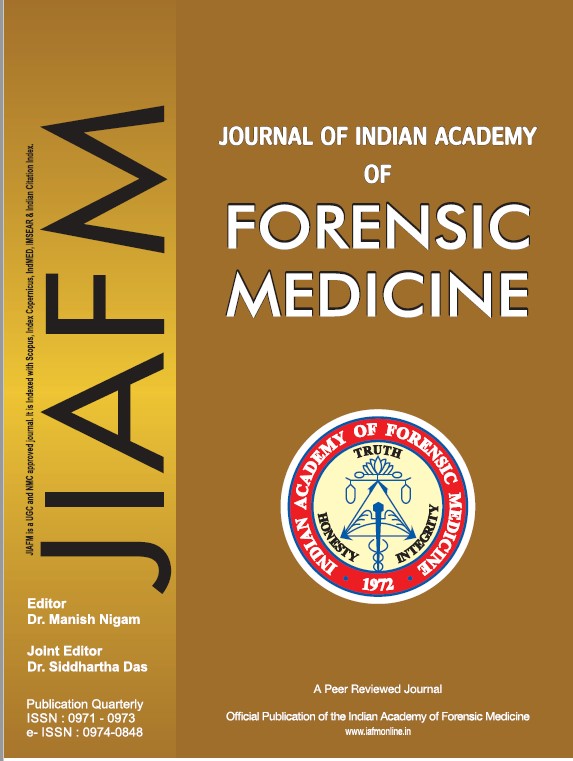Perceptions of Relatives’ towards Medico-Legal Investigation and Forensic Autopsy: A Survey from Rural Haryana
DOI:
https://doi.org/10.48165/Keywords:
Autopsy, Family members, Perceptions, Medico-legalAbstract
Currently a greater emphasis is being placed on the active participation of patients and their families; it is time that the attitude and feelings of the families with regard to autopsies are investigated. Therefore present study was planned with an objective to analyze deceased family member’s attitudes towards medico-legal investigation and Forensic autopsy. An additional objective was to determine factors influencing autopsy refusal by relatives of the deceased. 200 family members or relatives were selected randomly from the list of address and contact number prepared from the autopsy cases from 2010 to 2012. Data of 165 was processed and analyzed. 30.9% of the respondents had a primary level of education while 35.2% of them were illiterates. A high proportion of study subjects considered that autopsy would result in visible disfigurement of the body. Involvement of police/ court (92.1%), no use in knowing the cause of death/ nature of death (88.6%) and autopsy delays funeral (83.4%) were three top most causes responsible for autopsy refusal by family members or relatives of the deceased. The experience and opinions of relatives and family members can be utilized in more effective management of medico-legal cases.
Downloads
References
Brown HG. Perceptions of the autopsy: Views from lay public and program proposal. Hum Pathol 1990; 21:154–8.
Schaaf G, Meyboom-De Jong B. Hoe wordt euthanasie door naasten ervaren? [How is euthanasia experienced by family members?] Groningen: Department of General Practice, University of Groningen, 1991.
McPhee SJ, Bottles K, Lo B, Saika G, Crommie D. To redeem them from death. Reactions of family members to autopsy. Am. J Med 1986; 80: 665–671.
Van den Weel JG. Obducties als kwaliteitsinstrument serieus nemen. [Autopsies have to be taken seriously as an instrument for quality assurance] (with English summary). Ned Tijdschr Geneeskd 1999; 143: 2351–2354.
Turner J, Raphael B. Requesting necropsies. Greater humanity and awareness of suffering will help doctors and patients alike. Br Med J 1997; 314: 1499–1500.
Behera C, Rautji R, Dogra TD. Relatives’ attitudes towards medico-legal investigation and forensic autopsy: a study from South Delhi. Med. Sci. Law 2008; 48 (2):159-62.
Lishimpi K, Chintu C, Lucas S, et al. Necropsies in African children: consent dilemmas for parents and guardians. Arch Dis Child. 2001; 84:463–467.
Bierig JR. Informed consent in the practice of pathology. Arch Pathol Lab Med. 2001; 125:1425–1429.
Sanner MA. In perspective of the declining autopsy rate: attitudes of the public. Arch Pathol Lab Med. 1994; 118:878–883.


